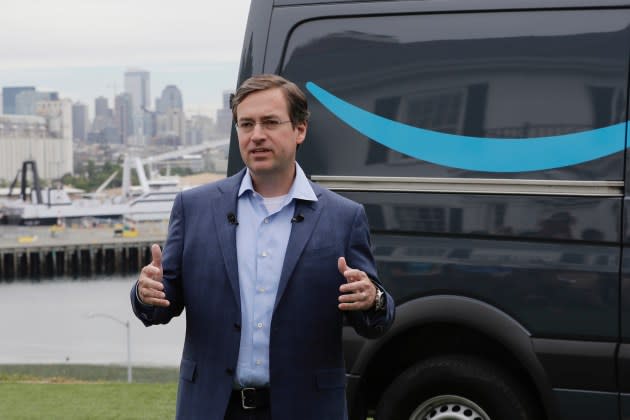What Dave Clark’s Exit Could Mean for Flexport

Flexport CEO Dave Clark is exiting the digital freight forwarder just a year into being brought onto the job.
The surprise resignation was first reported by Clark himself, who revealed on Twitter that Flexport was shifting its focus back to its core freight business, with founder Ryan Petersen returning as CEO of the company.
More from Sourcing Journal
I just shared this internally with the teams @flexport. Wishing the team nothing but success on the journey! pic.twitter.com/mIfhdBb7QG
— Dave Clark (@davehclark) September 6, 2023
The tweet suggests differing mindsets between Clark and Petersen, who in March abdicated the chief exec post he shared with the 23-year Amazon veteran after his hiring in September 2022.
“Founders have the right to change their mind,” Clark said in his note.
Flexport confirmed the resignation to Sourcing Journal, but did not comment further. Petersen also confirmed his return in a tweet.
I'm back!!!
— Ryan Petersen (@typesfast) September 6, 2023
Clark led logistics at Amazon until January 2021 and is known for building out the e-commerce giant’s extensive fulfillment network. He was then promoted to CEO of the company’s consumer business, effectively running their entire retail operation before leaving the tech titan.
The executive changes come mere months after Flexport purchased Shopify’s e-commerce fulfillment technology wing Deliverr, which added business-to-business distribution and last-mile delivery to the company’s portfolio of services and further escalated the alliance between the two companies.
At the time, the purchase was designed to make it easier for the freight forwarder’s businesses to plan, visualize and execute the movement of goods from manufacturer to the customer’s store or door, all unified under one technology platform.
But now, with Clark’s departure, the future of these non-core businesses remain in flux, leaving Shopify looking for answers, according to Rick Watson, CEO and founder of RMW Commerce Consulting. Shopify notably just partnered with Amazon, giving its merchants access to the company’s fulfillment services and enabling them to integrate the “Buy with Prime” service online.
“The question is, if this isn’t Flexport’s direction, then does Shopify needs a new partner—and does Shopify cut back some of those clients that were built on the partnership to begin with?” Watson asked. “It’s not just Flexport that has to deal with the effects of Dave Clark leaving and Ryan Petersen’s decision. Shopify and other players in the industry are affected as well.”
Watson said the pairing of Clark and Flexport were never a fit to begin with, calling it a case of a virtual logistics business meeting a logistics infrastructure builder.
“When Dave Clark became available, my sense is [Flexport] used that as an opportunity to increase their aperture,” Watson said. “They thought, ‘How big could this business be if we took over all logistics infrastructure everywhere?’ and I just think it became more apparent that that was going to be something extremely hard to do. Where are the customers and the margin going to come from?”
Watson noted that the company’s basis in software instead of owning fixed physical assets—and its rekindled focus on a commodity like freight—still makes the company overvalued, as it struggles to generate profitability.
“Flexport, as a virtual business, never owned anything, yet was trying to compete with big players in the freight market. It never fully added up that they were going to be a huge player from a volume point of view in the space, which meant that their valuation probably got ahead of itself,” said Watson. “They’re basically a technology solution. I think they need to stick to that to the small-and-medium business (SMB) type market if they’re going to be successful.”
The company is expecting to launch a self-serve SMB supply chain solution next week, Petersen said in a follow-up tweet. The announcement of the product was anticipated to be revealed Thursday, but was pushed back upon Clark’s resignation.
“SMBs are buying fulfillment capabilities for a somewhat higher price than the big players would buy for. If you try to go to the big players directly to access those capabilities, your volume wouldn’t be high enough to be a customer. There are a lot of 3PLs that won’t take SMBs as customers for a reason. They’re not profitable, and they go out of business,” said Watson. “If a logistics provider is going to take on SMB customers, they need to charge much higher prices to make up for that fact, that means that they’re not going to be a volume player in the market, because SMBs don’t have any volume.”
Petersen also indicated in his tweet that the company would be launching a new enterprise suite in the first quarter of 2024.
Founded in 2013, Flexport has raised $2.3 billion from investors, including a $935 million round completed in February 2022 that valued the business at $8 billion. But the company had struggled to become profitable amid the global slowdown in freight volumes. In January, Flexport laid off about 20 percent of its staff, or 640 workers.
